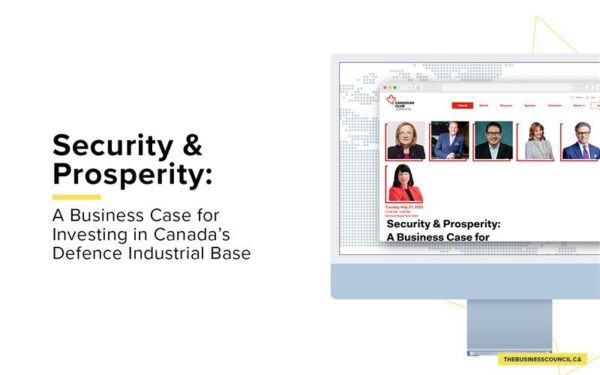Letter to Finance Minister Morneau outlining measures to boost public confidence and help set the stage for a lasting economic recovery
Dear Minister,
One hundred days ago, members of the Business Council of Canada published an open letter urging their counterparts across the country to join them in a shared battle against COVID-19.
Businesses in all sectors were quick to step up. In industries such as energy, agri-food and transportation, companies that provide essential services to Canadians adopted strict new guidelines to protect the health and safety of front-line workers.
Firms of all sizes, in all regions, closed their offices and implemented work-from-home arrangements for non-critical functions. When airspace and border restrictions left thousands of Canadians stranded abroad, telecom companies and airlines worked with federal officials to get messages through to travellers and bring them home safely.
While layoffs were unavoidable in some cases, many of Canada’s leading employers made special efforts to keep employees on the payroll regardless of whether there was work to do or customers to serve.
Meanwhile, companies across Canada answered the call to ensure that front-line health workers had sufficient supplies of personal protective equipment and life-saving medical equipment to care for Canadians. To mitigate the economic impacts of the health emergency, Canada’s leading companies donated hundreds of millions of dollars in funding and other resources to food banks and charities of all kinds.
Today, as the health emergency eases, we are helping to spearhead the POST Promise, a Canada-wide COVID-19 awareness campaign aimed at keeping customers, employees and communities safe as the economy reopens.
As an association of business leaders in all sectors and regions of the country, the Business Council is pleased to have been able to work closely with your government in responding to the pandemic. Your personal support, as well as that of other members of Cabinet and the Prime Minister, is much appreciated and has served as an important source of reassurance to Canadians at a time of great need.
As we look ahead, we believe a similar spirit of collaboration between the public and private sectors offers the best hope for a strong and healthy recovery that benefits Canadians in all communities and in all walks of life.
Some of the economic challenges facing Canada are structural in nature and unrelated to the pandemic. Left unaddressed they will continue to weigh on job creation and business investment as the COVID-19 crisis abates. Among other pressures, our country’s population is aging, our regulatory systems are overly burdensome, and our tax system is increasingly uncompetitive by international standards.
Our Task Force on Canada’s Economic Future addressed each of these challenges in its October 2019 report. In our view, the report’s recommendations are even more relevant today, given high levels of unemployment and government debt, and the consequent need for policies to promote long-term growth.
At the same time, there are a number of measures the federal government could take in the near term to boost public confidence and help set the stage for a lasting economic recovery:
Continue to expand COVID-19 testing and contact tracing. Now that the initial wave of infection has passed, we must be vigilant about suppressing future outbreaks. We urge the federal government to continue working closely with the provinces and territories to implement a comprehensive, Canada-wide COVID-19 testing and tracing strategy that includes widespread deployment of a digital contact-tracing app.
Selectively ease travel restrictions. During the height of the pandemic, it made sense to prohibit non-essential international travel and to require that people arriving from abroad self-isolate for 14 days. It is now time to begin relaxing some of those restrictions by adopting an evidence-based approach to risk management. As a first step, Canada should allow non-essential air travel to and from countries that have demonstrated a high degree of success in their antivirus efforts. It is also time to eliminate interprovincial travel restrictions. There is no longer any justification to prohibit Canadians from exploring their own country.
Provide immediate support to Canada’s hard-hit travel, tourism and hospitality sectors. COVID-19 has dealt a heavy blow to Canada’s airlines, hotels, restaurants and tourism operators. Easing travel restrictions will lessen some of the pain, but it will likely take years before the travel and hospitality industries achieve anything close to a full recovery. The federal government could help by offering loan guarantees, introducing tax incentives to promote domestic travel, and extending the Canada Emergency Wage Subsidy to the end of the year or beyond for hard-hit travel and tourism operators.
Accelerate infrastructure approvals and investments. To help get Canadians back to work quickly, the government should fast-track national infrastructure projects that will promote economic growth, productivity, and the transition to a lower carbon economy. Priorities include: 5G and high-speed internet initiatives; export-enabling investments in transportation corridors, ports and border gateways; and electricity generation, transmission and distribution networks. At the same time, we cannot ignore the importance of stronger social infrastructure such as high quality, affordable day care – a subject on which I and Hassan Yussuff, President of the Canadian Labour Congress, are in full agreement. Closer cooperation among all levels of government is needed to expand the availability of quality learning and childcare, which promotes equal opportunity across social classes and enhances labour force participation.
Help displaced workers transition to new jobs. The government should expand training support programs for displaced workers in sectors that will struggle to recover from the economic effects of COVID-19. At the same time, it is important to begin responsibly winding down the Canada Emergency Response Benefit (CERB) so that it does not function as a disincentive to work. Modifications could include an income-tested clawback and the introduction of a temporary working bonus program modeled on the Canada Workers Benefit for low-wage workers. Meanwhile, the government should undertake to fill gaps in EI eligibility so as to assist those who need additional support while looking for work or receiving training.
Minister, the members of the Business Council of Canada are grateful for your service to the country in these extraordinary times. We trust these ideas will be of value as you and your colleagues work to ensure a sustainable and broadly based economic recovery. We stand ready to work with you in the interests of building a better Canada.











